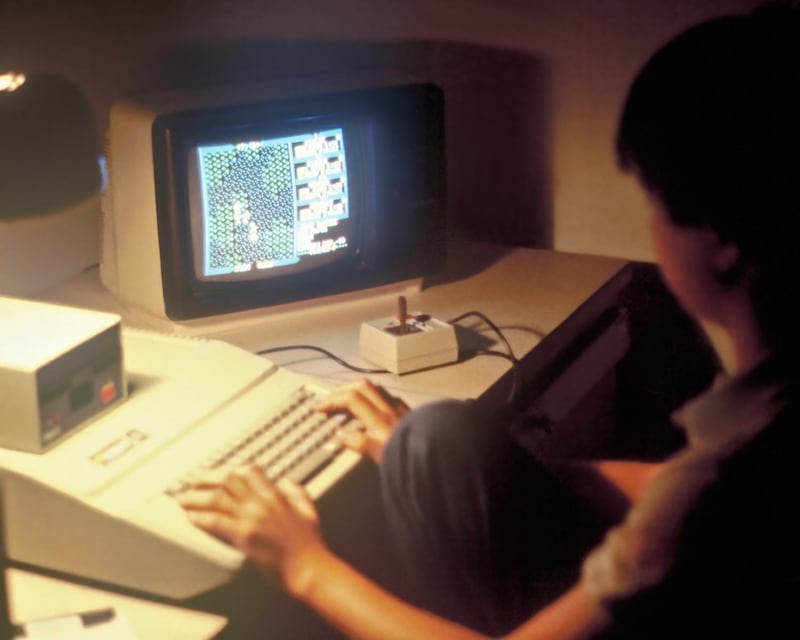The Founder Series is a column by and about Utah founders and how they got to where they are today. Click here to read past articles in the series.
Igrew up in Los Angeles, California, and was kind of a rowdy teenager. Because of this, I moved to Utah when I was 16 years old and lived with my sister while she worked at the University of Utah as an academic advisor. The arrangement only lasted like 30 days and she was like, “You’re out of here!” So I got a job in the mall at Radio Shack to support myself.
Remember Radio Shack?
I also started selling Ginsu knives at a swap meet on the weekends, though it was not good money. But then I saw this late-night knife commercial and the salesman was totally making a show out of it. I absolutely loved it, so I had this idea to dress up in my karate outfit and do a show for people in person. It was stupid stuff, but people were entertained and entertained people buy stuff. I started making $2,000 a day every weekend selling those knives!
Meanwhile, I was still working my Radio Shack job, and one day this older guy brought in his radio to be fixed. I was able to replace a little fuse and get it working pretty quickly. When he asked what he owed for the fix I told him not to worry since it was a cheap part and an easy job. His response to me was:
“Do you like Chinese food?”
I said, “Of course!” Then this guy shared with me that he sold his company for a little over $1 billion. He was retired now and wondered if I had a mentor. His offer to me was that if I could keep his computers and electronics running, then he would mentor me over lunch each week.
Within three years I made $1 million.

Founding my first company
Each week I met with my mentor to discuss real estate, stocks, tech, and everything in between. One of his recommendations was that I get a new job, so I went and worked at a big electronics retailer. With the help of this mentor, I became their top sales guy and a few years later, when they went out of business, I started PC Laptops.
That was over 30 years ago.
When the company first started, we were running traditional TV and radio ads, as well as putting up ads in movie theaters before the movies. I think almost everyone in Utah has seen me doing dumb stuff on a screen at some point over the last few decades.
As it turns out, we were really ahead of our time. The kind of stuff I was doing on TV ads then is exactly what viral social media is made of. Even now, I’ll grab one of our videos from the 1990s and post it on social media and it’s like it was always meant to be there. We should’ve had TikTok back then!
The cool thing is, as advertising was transitioning into social media we just took those TV ads and posted them as they were. We immediately grew a very big following, because not too many people were doing Facebook ads yet. But we were prepped and ready to go. Facebook was the first platform for our team to really engage over social media. It’s still completely essential and necessary today, and a lot of the stuff you see from us is exactly the same type of content we’ve always been creating.
Since founding PC Laptops, my business interests have spread to gaming computers, Xidax.com, real estate development, computer security software, an upcoming crypto hedge fund, and more. My companies are taking care of tech for organizations like Intel and Amazon, but also for individual consumers, streamers, musicians, and anyone else who needs a great, high-end computer that can do really industry-specific things.
One of my favorite things about my career is that I’ve learned firsthand how computers have the ability to educate anyone and everyone. A ton of the stuff that is coming into play in tech isn’t even being taught in colleges yet. You’ve got to learn this emerging tech on your own, on the street, and you need the right tools to learn it. That’s why I’m so passionate about educating people on all these new things via my companies. It’s been amazing to watch the evolution of tech, and even more amazing to be a part of it.
The value of a mentor
Over the course of my career, mentors, like the one I met at Radio Shack, have made all the difference for me. I love learning from experts in various fields and I go out of my way to look for people who are 100 times more successful in an area than I am. That’s usually my qualification because then it’s really easy for them to bring what I can’t to the table.
I’ve had dozens of different mentors throughout my life, all specializing in everything from real estate, stocks, cryptocurrency, and tech. I really value these relationships, and they just save me so much time. Having a good mentor is the difference between having to spend years gaining experience and a couple of phone calls to decide how we need to do things. I wouldn’t be where I am today without their help, so I’ve made it my mission to help the next generation of entrepreneurs.
I really believe that you can throw a fish at someone, or you can teach them how to fish for themselves—and I really love teaching people how to fish. That’s where my podcast, Dan’s Millionaire Code, comes in. I wanted to mentor more people than possible traditionally and this is a great vehicle for that. I don’t make any money from the podcast—no sponsorships, no ads. It’s philanthropy, providing education, and sharing my experience.
Every week or two I try to bring on someone who is amazing at what they do—people who have built a legacy in their industry. My guests are people who are anxious to give back, to share their knowledge with others. Whatever someone wants to do, there’s something that they can learn from the people I talk to. I’ve had entrepreneurs, YouTube streamers, actors, real estate moguls, investors, fitness experts, and founders all come on to share their experiences.
Regardless of if you’re an aspiring artist or someone in sales, you can look through the podcast guests and find someone who resonates with you. I’m proud of the series, and I think facilitating education opportunities and making them available to everyone is one of the most important things I can do.
Growing through Covid
The last couple of years has really been a test for businesses to see how they can adapt and meet the needs of their employees and customers—both materially and psychologically. From the start, we set things up to accommodate people as individuals and met everyone’s comfort level as best we could. Our goal was to help everyone be comfortable as we continued to conduct business and serve our customers well.
The way to meet people’s needs is to ask them what they are, so I asked my team what they wanted to do. Some people said they were more comfortable being behind the scenes in a clean room, that’s great with me. Some were happier working face to face with customers, awesome, we need that too. We were there to help them, to find a solution that kept everyone working and in a good place mentally.
Because of that attitude, our group of companies had some insane expansion. Some businesses were forced to close, but I also feel like some closed without really trying everything that they could have. It was a panic. But thanks to the .com bubble crashing a decade or so ago, I was more prepared for this latest challenge. It seems like every decade or two something big happens, and businesses are faced with the choice to regress or progress.
I’ll pick progress every time.
Looking ahead
Today, there’s so much corruption going on out on the internet. I probably get 300 messages a week of people impersonating me, trying to scam others. There is a shocking amount of creativity. With the energy these people are putting into their schemes, they could easily be millionaires if they started their own business solving problems instead of making them!
Going forward, I want to keep teaching people how to use their tenacity, their innovation, and their tech to make a positive impact. Find something you care about. Find people who know more about it than you do. Then learn as much as you can and give generously.
You can get there.
I think the key for any company, whether you’re starting out or trying to grow, is to be able to share your unique ability to help people. How are you actually giving value with what you do? You’ve got to give value. I think that’s what most companies need to look at is how can I serve and give—and then you get, too. It’s just Karma.

